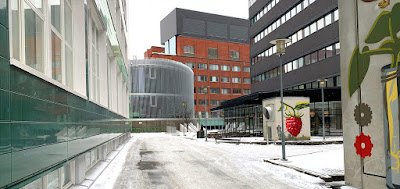Circular bioeconomy made local in Kera area
Tekstin on kirjoittanut Chris Holtslag Helsieni-yrityksestä. Helsieni sijaitsee Espoon Kerassa ja toteuttaa siellä parhaillaan yhtä 6Aika KIEPPI -hankkeen piloteista. Pilotin havaintoja ja tuloksia tullaan jakamaan blogissa lähikuukausina, tämänkertaisessa kirjoituksessa kuvaillaan Keran alueen virtoja alueellisen kompostoinnin näkökulmasta.
The Kera area in Espoo, Finland is developing a cluster of food production and processing activities. In the circular economy there is no concept of “waste”, everything is food for something. Organic materials are used to regenerate natural systems by returning them to the soil to become food for plants again. Energy is used as little as possible and as much as possible from renewable sources.
Composting
Currently in Espoo most of the industrial biowaste generated by food businesses like microgreen growers or breweries is collected and transported to a municipal waste management facility where it is mixed with household biowaste (kitchen scraps) and composted. Even though this compost is in theory available for citizens to pick up at a relatively low price, there are some problems with it:
- Plastics: Because of the diverse sources the amount of plastics in this compost is relatively high. Even though most of it is being removed in the composting process, it is impossible to take out everything.
- Accessibility: The facility is remote and the compost is not conveniently packaged, so the amount of people picking up compost for their gardens is quite small.
- Bad user experience: There is very little communication about the availability of the compost online and arranging a delivery and payment of compost requires many steps.
The result is that most of compost ends up being sold to big companies that use it at distant locations outside the municipality, and that local gardeners are buying bags of sterile compost (usually with large amounts of peat) which also has to come from far (there is no peat mining or commercial compost producers in Espoo). This presents us with the opportunity to connect the supply of plastic-free biowaste generated by local companies to the demand by local (community and market) gardeners for living compost. There could be a business opportunity as well for developing a micro-composting facility, if the gardeners do not have their own composting option. The compost only needs to be turned once and could provide useful employment for the snow shoveling personnel and the equipment that is parked in the area during times without snow.
Companies in the Kera area generating biowaste and frequency
About Helsieni
Helsieni is a circular urban mushroom farm located in the Kera area in Espoo. The oyster mushrooms are sold to restaurants and supermarkets. The biowaste it generates, spent mushroom substrate, is sold to gardeners. Gardeners love it as it can be placed in the shadiest place of the garden, it will still give plenty of mushrooms if watered or rained on and it functions as a weed suppressing mulch that can be placed around any plant. Additionally, the mushrooms thrive in cold temperatures so that gardeners can get a yield early or late in the growing season.
A mushroom bed planted around herbs and tomato plants
As a part of 6Aika KIEPPI project, Helsieni is piloting the use of beer mash or spent brewer’s grains as a substrate for growing oyster mushrooms. The trials are ongoing and results will be published early 2021.



Kommentit
Lähetä kommentti